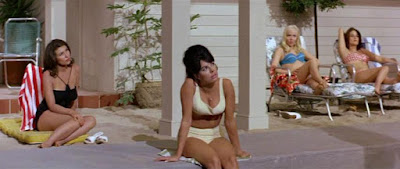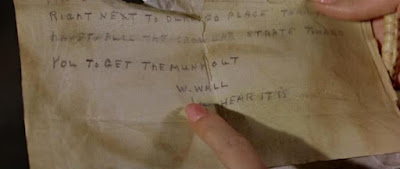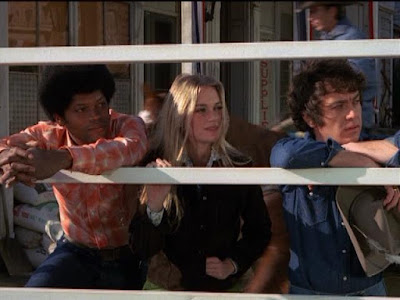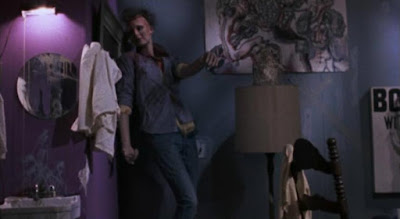
Of the 32 films Elvis Presley shot between 1956 and 1969 none are quite as strange as the oddly effective Tickle Me (1965), the one picture in Presley’s filmography that can be viewed as a deliberate parody of the typical 'Elvis Movie'. Tickle Me is a deliciously sly and wickedly funny film that takes the Elvis film formula and turns it up to eleven.
Elvis plays Lonnie Beale, an injured rodeo rider who makes cash on the side playing his songs in whatever roadside dive will have him. Lonnie’s freewheeling life takes an unexpected turn when he lands a job at an all-female spa designed to turn out of shape starlets into sex-bomb glamour queens. Things get even weirder when Lonnie gets involved with a beautiful instructor named Pam, who is searching for some hidden gold her Grandfather left in a local ghost town called Silverado.
Author Bill Bram notes in the excellent Elvis in Tickle Me book from JAT Publishing that Tickle Me was designed as a vehicle to save the nearly bankrupt Allied Artists, an independent Distribution and Production Company that had been active since the forties. After an incredibly prolific and successful run in the fifties, things had begun to dry-up for Allied Artists and they hadn’t had a hit since Billy Budd in 1962. Producer Ben Schwalb was convinced that a quickie Presley picture could give Allied Artists the profit-making film they so desperately needed and he approached Colonel Tom Parker about the possibility in late 1964.
It has often been reported that Tickle Me was made possible by the fact that Parker and Presley took a major pay-cut to make the film for Allied Artists but Bram dismisses this as “unlikely”. Instead Parker helped the company cut-costs with the novel idea of using previously released Elvis songs for the soundtrack instead of commissioning, and producing, new ones. This, combined with the fact that the film would be shot in less than a month on a shoe-string budget, allowed Allied Artists to get their Presley picture and save their company in the process.



Elvis wasn't the only major icon Allied Artists had in mind for Tickle Me, a slapstick comedy based on an original script from former Three Stooges writers Elwood Ullman and Edward Bernds, as the idea of bringing Brigitte Bardot on board had been seriously approached. Sadly Bardot simply was not interested in coming to America to make a film, so Schwalb got the idea to cast a young up and coming actress who had been christened ‘The British Bardot’ to play Elvis’ love-interest and stunning Jocelyn Lane was cast as Elvis' leading lady.

Unforgettable Jocelyn Lane remains a bit of an enigma in the realms of sixties cinema. Austrian born, but British raised, Lane should have without question become one of the biggest stars of the era but, by the early seventies, her film career was over after she married a Spanish Prince! Tickle Me remains one of the most well-known films in Lane’s career and she is a real stunner in it. Sexy and witty with a detachment that might be mistaken for snobbishness if she wasn’t so damned charming, Lane was one of Elvis’ great, if often unheralded, co-stars and the two got along well on the set (and were even rumored to have briefly dated according to some of the vintage articles uncovered in Elvis in Tickle Me).




While it is hard to take your eyes off Jocelyn Lane (and, of course, Elvis) while watching Tickle Me another great icon is also on board for the fun. Playing the head of the all-girl ranch is none other than beloved genre-icon Julie Adams, captured here just over a decade after her timeless turn opposite The Creature from the Black Lagoon (1954). Elvis in Tickle Me) publisher Joe Tunzi located some splendid pictures of a laughing Adams and Presley behind the scenes of Tickle Me and Adams apparently had a great time making the film and working with Presley, whom she would later recall did everything “beautifully” during the shoot.


Bill Bram writes in Elvis in Tickle Me that the set was, “very easy going and relaxed” and that comes through while watching the film, as it is so delightfully breezy and fun. It’s the one film in Elvis’ career where he was allowed to poke fun at his, at times, slightly ridiculous screen persona. Former Martin and Lewis director Norman Taurog even allows Elvis to give a sly look directly at the audience at a couple of different times during the film; breaking that fourth wall with a daring admission of silliness thereby allowing the audience to know that he and Elvis are, this time at least, in on the joke. Tickle Me is downright subversive at points with its ramshackle structure (I have always suspected the script was written to correspond to pre-existing sets Allied Artists already had) and its devil-may-care attitude. Hell, the damn thing features songs, fights, bikini-clad beauties, a fantasy western sequence and a haunted house! In other words, it has everything a lover of lightweight sixties cinema could ask for.



Bram credits a good part of the good-natured fun at the center of Tickle Me to Michael Hoey, a writer who was on set the whole time working with the dialogue and story. Credit also goes to Presley himself, who was such a wonderfully intuitive actor in the first-place, as he improvised throughout the film. The wonderful Kentucky born Ed Faulkner, who would tell Bram that working with Elvis was, “one of the highlights” of his career recalled that Taurog, “knew what he wanted and he knew how to get it out of his actors”, and Elvis delighted in playing the straight man to the insanity around him.




Perhaps the most genius thing about Tickle Me is Colonel Parker’s original suggestion that they pick some relatively unknown Elvis songs to use as the film’s soundtrack. Parker, who made a lot of awful choices regarding Elvis’ career in the sixties especially, really hit gold with this idea and the soundtrack for Tickle Me is nothing short of extraordinary. The nine songs chosen for the film (including “It’s a Long Lonely Highway”, Night Rider” and “It Feels So Right”) are all masterful works and they bring a real spark to the musical sequences in the film. Elvis is still clearly enjoying himself here (compare the way he looks and acts here to his performances in Paradise Hawaiian Style and Clambake just a couple of years later) and he would eventually call Tickle Me one of his favorites in the uber-personal Elvis on Tour (1972).







While it certainly didn’t capture audiences the way Viva Las Vegas had a year before in 1964, Tickle Me was hit with audiences (and even some critics) when it premiered at the end of June 1965. Armed with an aggressive and fun Allied Artists advertising campaign (theaters were sent colorful tickle feathers with the press materials), Tickle Me scored with fans who saw it for what it was, a smart comedy that delighted in being as silly as it could possibly be.


Elvis Presley’s film career would sadly slip badly by the end of 1965 and it wouldn’t be until 1968’s wonderful Live a Little, Love a Little that it would begin to creatively spark again but, by then, it was too late as dreadful works like Easy Come, Easy Go and Double Trouble (both 1967) had already done too much damage. Tickle Me was a relatively forgotten film in Elvis' catalogue up until its DVD release a few years back.
While there are certainly a number of Elvis films I value more, I highly recommend Tickle Me for fellow lovers of Elvis Presley who perhaps haven't seen it, or to films fans who have a love of lightweight comedies of the sixties that served up equal helpings of goofiness and subversion.
...

































